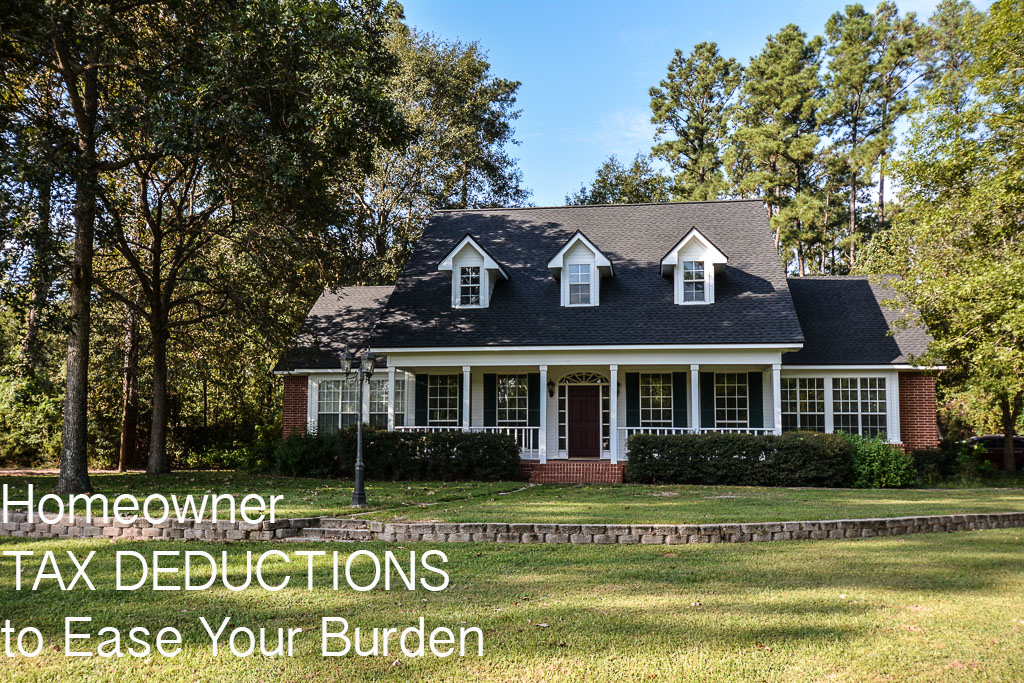Homeowner Tax Deductions
Posted by Janet Owens on Wednesday, March 9th, 2016 at 2:04pm.
Homeowner Tax Deductions that May Help You Out

Let’s face it, taxes are here to stay and will only increase as time goes on. We all need to pay our fair share but you shouldn’t pay more than you have to. As a homeowner, you’re paying not only income tax but also property tax. Here are some ways you can boost your tax savings by taking advantage of Homeowner Tax Deductions.
Mortgage Interest and Refinancing
For most of us, a large portion of our monthly income goes directly toward the house payment. Thankfully, you can deduct the following on your on your taxes:
Interest Paid on the Mortgage
- Points and Origination
- PMI (Private Mortgage Insurance)
- Interest on a Home Improvement Loan
- Interest on a Home Equity Loan (up to $100,000 debt)
- Rental Property
Did you also know that you can deduct the interest you pay on a loan secured by your primary residence on a second home? A second home can be any other home that you own and treat as your second home. It can even be a mobile home, house trailer, houseboat or recreational vehicle as long as it has sleeping, cooking, and toilet facilities.
Property Tax
Property taxes, especially in Texas, make up a large portion of the monthly house payment and are tax deductible.
Medical Home Improvements
If the main purpose of the medical home improvement is to provide medical care to you, your spouse, or your dependent. However, you must itemize your deductions and the cost must exceed 10% of your adjusted gross income. If you’re over 65, the cost must exceed 7.5% of your adjusted gross income.
Additionally, the cost of the improvement must be reduced by the amount it increases your property value. If the property value is not increased, the entire cost can be included as a medical expense. Here are some examples of medical home improvements:
Making the residence wheelchair accessible
- Installing Ramps
- Lowering Cabinets
- Modifying Bathrooms
- Adding Handrails
- Widening Doors and Hallways
- Modifying Stairways
Tax Credits for Energy Efficient Home Improvements
If you upgrade your home to improve energy efficiency or use renewable energy, you may be eligible for tax credits to offset some of the costs. There are two tax credits that are good through 2016 that use renewable energy. One is the Energy Efficiency Property Credit. The second one is the Nonbusiness Energy Property Credit.
The Energy Efficiency Property Credit can be used for solar, wind, and geothermal equipment on both your primary and secondary residences. Fuel cell equipment can only be used on your primary residence.
The credit is equal to 30% of the cost of equipment and installation with no upper limit on the amount of credit for solar, wind, or geothermal. There is a maximum credit limit of $500 for each half kilowatt of power capacity.
The Nonbusiness Energy Property Credit can be used if the equipment and materials meet the technical efficiency standards set by the Department of Energy. For this credit, the IRS distinguishes between two types of upgrades.
The first is the Qualified Energy Efficient Improvements and it includes such things as:
- Home Insulation
- Exterior Doors
- Windows and Skylights
- Certain Roofing Materials
The second one is the Residential Energy Property Cost and it includes:
- Electric heat pumps
- Electric heat pump water heaters
- Central air conditioning systems
- Natural gas, propane or oil water heaters
- Stoves that use biomass fuel
- Natural gas, propane or oil furnaces
- Natural gas, propane or oil hot water boilers
- Advanced circulating fans for natural gas, propane or oil furnaces
If you install equipment like storm doors, energy efficient windows, insulation, air conditioners and heating systems, you can get a tax credit up to $500, with the following maximum credit limits:
- $200 for windows
- $50 for a furnace circulating fan
- $150 for a furnace or boiler
- $300 for any other single residential energy property cost
For more information, please consult your CPA or tax preparer.

